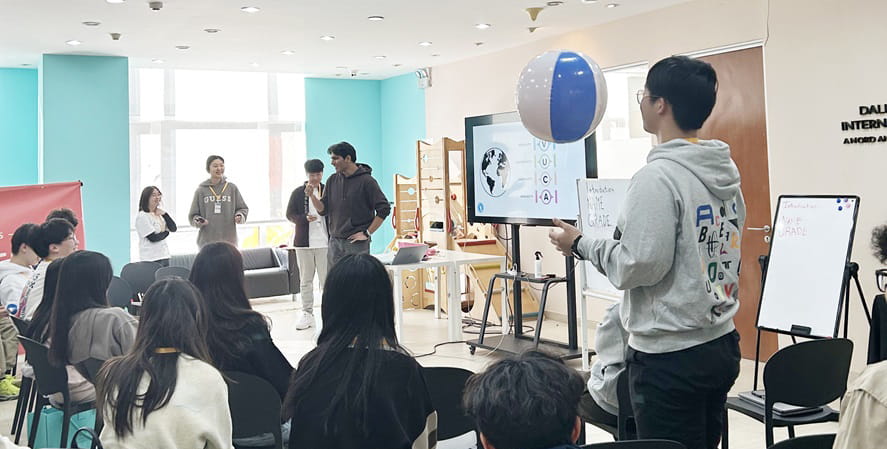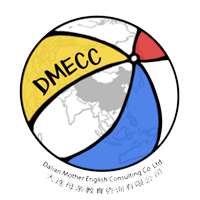Open Days
Register for our Open Day

The Second DMECC Youth Summit took place on February 22-23 on DAIS campus, bringing together G7-G12 students for an engaging leadership experience. Sessions covered time management, volunteerism, mentorship, and business skills, along with insights from IKEA Dalian on corporate sustainability. Students also collaborated on action plans to support various NGOs and initiatives, gaining valuable real-world experience.
DMECC is a youth-led service learning Social Enterprise focused on empowering teens to develop their leadership abilities through volunteerism. The organization provides teens with the opportunity to become mentor of primary school children, who lack adequate access to education, thereby fostering a sense of responsibility and community engagement among the youth.
Hear from our youth volunteers as they share their insights and experiences from the summit!
DAIS: What was the most rewarding part of helping organize the summit, and why?
Dennis L., DAIS Grade 10: "Teamwork is essential for creating new ideas. When people come together, they communicate, share, and bring each other's thoughts to a higher level. As a leader, I took responsibility by encouraging quality discussions and motivating members within groups."
Alisha L., DHS Grade 10: I think the most rewarding part of organizing the youth summit would be to see the smile and joy from the participants, and I feel the fulfillment of organizing such a successful event."
Max S., DHS Grade 10: "The most rewarding part is that a few people put together this summit in a few days, which highlights our efficiency lol"
Selina X., DHS Grade 10: "The most rewarding part of helping organize the summit is that my friends and I can enjoy working together as a group. During this period, we can help each other to complete a group project."
Nick Z., DHS Grade 10: "The most meaningful part is that friends can share different ideas with each other and develop our critical thinking skills."

DAIS: How did your role in the summit change the way you view leadership and teamwork?
Alisha: "As a youth executive, my role in a youth summit was to organize games and lead my teammates. This changed my view of leadership because I noticed that the main task of a leader is not to carry the biggest responsibility and to complete all the work by themselves, rather, we need to learn how to distribute the work and organize the bigger picture."
Nick: "Team cooperation requires more communication and mutual understanding between members to achieve good outcome."
Selina: "In fact, before participating in this activity, I did not have much concept of teamwork, I think that some things can be completely solved by themselves. But after attending the Youth Summit, I found that a lot of group cooperation is still necessary. In this process, I can learn more knowledge and fields that I cannot access without my teammates."
Max: "Actually, I really enjoy working alone. I think I don't need a partner. But after working with my teammates to put on this summit, I realized that teamwork is also great. And Selina and I did a presentation together, which taught me a lot."
Dennis: "While hosting the summit, I learned a lot about being flexible. When a certain activity took longer than expected, we had to adapt to this changing circumstance. This experience challenged me to find and develop solutions in a short time, on spot."

DAIS: What new skills did you develop while hosting or running the event?
Nick: "Organizing the summit exercised my leadership abilities and improved my time management."
Selina: "I think my presentation skills and ability to make PPT have improved significantly."
Dennis: "My experience being a youth volunteer at the summit had significantly shaped my perspective on learning. What seemed simple at first—organizing schedules and hosting presentations—quickly proved to be challenging. These experiences taught me the value of 'learning by doing.'"
Alisha: "While hosting the event, I developed the skill of problem-solving. There are always unexpected challenges that happen, for example, when we were going to do a game but suddenly discovered that there was not enough material for it. When we quickly changed our train of thought and used the materials that we had to construct a similar game, I developed the skill of problem solving and adaptability."
Max: "I think my presentation skills have definitely improved since I gave a big 15-minute presentation."

DAIS: How did the experience of working with the youth participants impact you personally?
Selina: "Young participants always come up with novel ideas when I work with them. I think they have a lot of imagination and creativity. It also made me more active in thinking and participate more actively in their discussions."
Max: "Working with the youth participants inspired me with their enthusiasm and fresh perspectives, reminding me of the power of curiosity and creativity."
Nick: "The youth participants were passionate, curious and creative people, which impressed me deeply."
Dennis: "Working with the youth participants, we brainstormed sustainable solutions that addresses the UNSDGs, debated complex global issues, and developed collaboration methods with DMECC's NGO partners. Personally, I was inspired by how creative and passionate teenagers can be when they come together. Although adults contribute to our world the most, however, through today's experience, I believe that teenagers also have the potential to offer new perspectives and change the world."
Alisha: "When I worked with the youth participants, I was incredibly impressed by their abilities and potentials. They came up with marvelous ideas during workshops and I realized how much talent young people possess. I am excited to execute their ideas with them."

DAIS: How did being a youth volunteer at the summit help you grow as a leader, and what did you learn about managing an event like this?
Max: "I developed as a leader by learning how to assign duties, communicate clearly, and adjust to unforeseen obstacles while serving as a youth volunteer at the summit. My ability to collaborate and solve problems was improved by working with varied people since I discovered how to balance various viewpoints while keeping the event's goal in mind. Overseeing time-sensitive tasks taught me the value of organization and maintaining composure under duress. When plans altered, I also came to appreciate the importance of adaptability and prompt decision-making. In addition to giving me more self-assurance, this experience gave me useful skills for leadership positions in the future."
Dennis: "If learning is like bicycle riding, traditional education often relies on textbooks, lectures, and theory-based instruction. However, I believe the most impactful learning comes from actually “getting on the bicycle”—falling a few times and gaining empirical experiences."
Alisha: "Being a youth volunteer at the summit provided me a chance of being a true leader, for example to be responsible of organizing the workload and volunteers effectively. Furthermore, I learned more about the essentials of managing an event like this. We needed to plan ahead for games and speeches and communicate for venues and times; we had to be flexible when encountering incidents like adding games or deleting ones according to actual time, etc., and these unique experiences taught me to be adaptable and responsible."

Nick: "As a youth volunteer at the summit, this experience greatly improved my leadership skills. I learned how to communicate effectively, assign tasks, and remain calm and adaptable in the face of unexpected challenges. I also developed strong time management skills and the ability to make quick decisions under pressure. In addition, I realized that patience, adaptability, and teamwork are the keys to successful campaign management. This experience not only boosted my confidence but also provided me with valuable leadership skills for the future."
Selina: "Being a youth volunteer at the summit helped me have a higher sense of urgency about my time in leadership. When we don't do an activity on time, it has more of an impact on the rest of the team. Also, I learned to have a clear division of labor in terms of leadership, so that every student who participates can have a higher sense of accomplishment. In managing this activity, I learned to deal with all kinds of emergencies. Everything is not as perfect as imagined, when there is an emergency, you need to think of a timely strategy to deal with. For example, when we give a speech in English, the audience might not understand. At this time, we must consider the audience and find a solution in time, such as finding a staff member to help translate."

The Youth Summit was more than just an event—it was a transformative experience for all involved. Volunteers honed leadership, teamwork, and problem-solving skills while adapting to real-time challenges. The summit highlighted the power of youth-driven change through collaboration and creativity. Inspired by this success, DMECC program leaders carried their experiences forward to the following summits in Beijing and Shanghai, continuing to grow as changemakers. With future events and community service initiatives ahead, they remain committed to making a lasting impact.